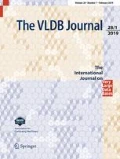Abstract.
The proliferation of mobile and pervasive computing devices has brought energy constraints into the limelight. Energy-conscious design is important at all levels of system architecture, and the software has a key role to play in conserving battery energy on these devices. With the increasing popularity of spatial database applications, and their anticipated deployment on mobile devices (such as road atlases and GPS-based applications), it is critical to examine the energy implications of spatial data storage and access methods for memory resident datasets. While there has been extensive prior research on spatial access methods on resource-rich environments, this is, perhaps, the first study to examine their suitability for resource-constrained environments. Using a detailed cycle-accurate energy estimation framework and four different datasets, this paper examines the pros and cons of three previously proposed spatial indexing alternatives from both the energy and performance angles. Specifically, the Quadtree, Packed R-tree, and Buddy-Tree structures are evaluated and compared with a brute-force approach that does not use an index. The results show that there are both performance and energy trade-offs between the indexing schemes for the different queries. The nature of the query also plays an important role in determining the energy-performance trade-offs. Further, technological trends and architectural enhancements are influencing factors on the relative behavior of the index structures. The work in the query has a bearing on how and where (on a mobile client or/and on a server) it should be performed for performance and energy savings. The results from this study will be beneficial for the design and implementation of embedded spatial databases, accelerating their deployment on numerous mobile devices.
Similar content being viewed by others
Author information
Authors and Affiliations
Additional information
Received: November 11, 2001 / Accepted: March 12, 2002 Published online: November 14, 2002
This paper is a significantly extended version of preliminary work that appeared in the Proceedings of the Very Large Databases (VLDB) 2001 Conference. The extensions include (i) a comparison of indexing alternatives carrying out the operations in a brute-force manner; (ii) observations showing that datasets do play a role in power consumption; (iii) architectural solutions to address the cache and memory hotspots for energy; and (iv) benefits when off-loading the work to a server over a wireless medium compared to doing everything on the handheld device.
Rights and permissions
About this article
Cite this article
An, N., Gurumurthi, S., Sivasubramaniam, A. et al. Energy-performance trade-offs for spatial access methods on memory-resident data. The VLDB Journal 11, 179–197 (2002). https://doi.org/10.1007/s00778-002-0073-x
Issue Date:
DOI: https://doi.org/10.1007/s00778-002-0073-x




